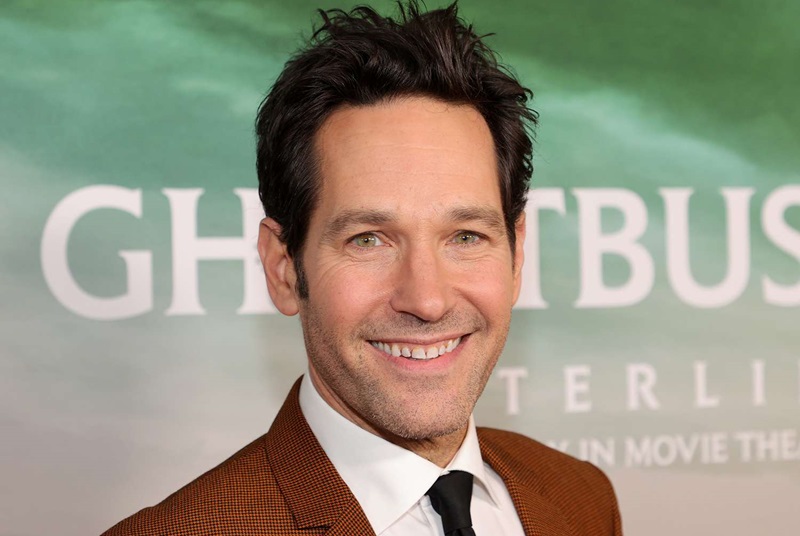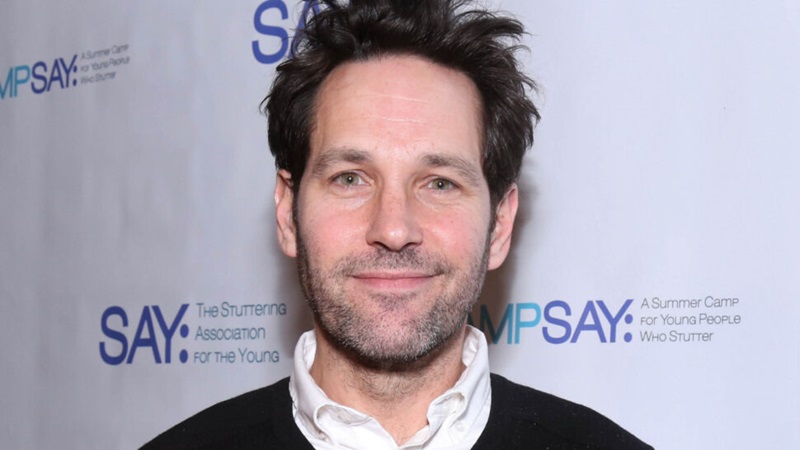Paul Rudd is an acclaimed American actor, screenwriter and producer, recognized globally for his charm, wit, and versatility in his roles. Born on April 6, 1969, in Passaic, New Jersey, Rudd’s passion for the performing arts led him to study theatre at the University of Kansas and the American Academy of Dramatic Arts.
The beloved actor’s career breakthrough came with the 1995 film “Clueless,” where his portrayal of the character Josh won the hearts of audiences internationally. Since then, Rudd has built an impressive filmography, showcasing his talent in a variety of genres, from romantic comedies like “The 40-Year-Old Virgin” and “This is 40” to superhero blockbusters like the “Ant-Man” series in the Marvel Cinematic Universe.
Rudd’s body of work also extends to the small screen, with memorable roles in popular television shows like “Friends” and “Parks and Recreation.” His role in “Friends” as Phoebe Buffay’s husband, Mike Hannigan, was particularly well-received, cementing his place as a television icon. In 2019, Rudd took on a challenging dual role in the Netflix series “Living With Yourself,” a performance that earned him a Golden Globe nomination.
Beyond his acting career, Rudd is known for his philanthropic endeavors, co-founding the charity “The Big Slick” which raises funds for the Children’s Mercy Hospital in Kansas City. Rudd’s affable personality, combined with his dedication to his craft and humanitarian efforts, has made him a respected figure in the entertainment industry. Despite his fame, Rudd remains down-to-earth, often credited for his youthful appearance and timeless sense of humor. His enduring appeal and consistent performances make him a reliable presence in Hollywood, with audiences eagerly anticipating his future projects.

Early Life and Career Beginnings
Growing up in a small town in the Midwest, Jane was always a curious child, constantly asking questions about the world around her. Her parents, both teachers, nurtured her curiosity and encouraged her to explore her interests. She was a voracious reader and spent countless hours in the local library, immersing herself in books of various genres. Her favorite subject was science, and she was particularly fascinated by the mysteries of the human body. This fascination led her to pursue a degree in biology at a prestigious university.
After completing her undergraduate studies, Jane decided to delve deeper into the field of human biology by pursuing a Ph.D. During her doctorate, she focused her research on the human immune system and its response to diseases. Her research was groundbreaking, and she was soon recognized as a promising young scientist in her field.
Upon receiving her Ph.D., Jane was offered a position at a well-known research institute. Here, she was given the opportunity to work with some of the leading scientists in her field. She was part of a team that was instrumental in making significant advancements in understanding human immunity. Her dedication and hard work were noticed, and she quickly advanced in her career.
Although Jane faced numerous challenges and obstacles along the way, she never let them deter her from her path. Her passion for science and her unwavering determination were the driving forces behind her success. Her early life and career beginnings were instrumental in shaping her into the accomplished scientist she is today. Despite her achievements, Jane remains humble and continues to strive for greater understanding and discoveries in her field.
Signature Roles and Achievements
Signature roles and achievements are key aspects that define an individual’s career, especially in fields such as acting, athletics, and business. These roles and achievements are often pivotal moments that propel a person into the limelight, or establish their reputation within their chosen field. For instance, an actor may be recognized for a particular character they’ve portrayed in a film or series, which becomes their signature role.
This role often sets the tone for their future projects, as well as their legacy in the industry. It becomes a reference point for their versatility, talent, and ability to captivate audiences. In sports, an athlete’s signature achievement could be a record-breaking performance or winning a prestigious tournament. These accomplishments not only showcase their skill and dedication, but also place them in the annals of sports history. In the business world, a CEO may be known for a groundbreaking deal or innovative product launch. These career-defining moments contribute significantly towards their professional stature, and often influence their future endeavors. However, signature roles and achievements are not confined to the professional realm.
They can also reflect personal milestones such as academic accomplishments, philanthropic activities, or unique skills. Such achievements are an important part of an individual’s identity, shaping their self-perception and how they are perceived by others. In essence, signature roles and achievements serve as a testament to an individual’s capabilities and contribution to their field. They lend credence to their expertise, while also setting a benchmark for others to aspire to. These roles and achievements are a reflection of the individual’s journey, marking key chapters in their story of growth and success.

Personal Life and Interests
Throughout a person’s existence, personal life and interests play a pivotal role in shaping their identity and determining their path. These elements are unique to each individual and can span a vast spectrum of activities, hobbies, beliefs, and values. For instance, a person may have a profound interest in art, expressing their creativity through painting or sculpture, while another finds solace in the serenity of nature, dedicating their free time to hiking or gardening. It’s these personal pursuits that lend color and meaning to everyday life, offering a much-needed escape from the routine and the mundane.
Our interests also serve as a mirror to our personalities, revealing aspects of our character that might remain hidden otherwise. A book lover’s penchant for mysteries could indicate a keen analytical mind, while a sports enthusiast might possess a competitive streak. These interests can often evolve into passions that drive individuals towards specific career paths or life-altering decisions.
However, personal life and interests are not only about hobbies and recreational activities. They also encompass relationships, family, friendships, and personal growth. They involve the pursuit of happiness, self-discovery, and fulfillment. They relate to how one spends their time outside of professional commitments, the choices they make, and the values they stand by. Personal life is the sphere where one can be their authentic self, devoid of societal or professional pretensions.
Equally important is the balance between personal life and professional life. Too much emphasis on either can lead to dissatisfaction and stress. Therefore, maintaining a healthy equilibrium is crucial for overall well-being. Ultimately, personal life and interests are integral components of human life. They add substance and depth to our existence, fostering satisfaction and contentment. They are the threads that weave the fabric of our lives, blending various hues to create a tapestry as unique as the individual themselves.
Awards and Recognitions
Awards and recognitions serve as a testament to an individual’s or an organization’s exceptional achievements or contributions in their respective fields. They stand as an affirmation of the hard work, dedication, and excellence that the awardee has exemplified. These awards can range from local to international levels, signifying the degree of one’s impact or influence.
In the realm of arts and entertainment, awards like the Oscars, Grammys, or Emmys are coveted recognitions that acknowledge the talent and creativity of artists. In the world of literature, the Pulitzer Prize or the Nobel Prize in Literature are esteemed recognitions given to authors who have made significant contributions to their craft. In the scientific community, the Nobel Prize in physics, chemistry, or medicine and physiology are among the highest honors that celebrate groundbreaking discoveries and innovations.
Meanwhile, in humanitarian and peace efforts, the Nobel Peace Prize is awarded to individuals or groups who have made substantial contributions to promoting peace and resolving conflicts. Recognitions are not only limited to these fields, as numerous sectors – from education, sports, business, and public service, among others – have their own set of awards that honor achievements of varying degrees. Awards and recognitions not only elevate the stature of the recipients, but also inspire others to strive for excellence, innovate, and make significant contributions to society. They serve as a reminder of the potential that individuals or groups can reach when they are driven by passion, dedication, and a commitment to their craft or cause.

Impact on Pop Culture
Pop culture, short for popular culture, refers to the prevailing tastes, attitudes, and ideas within a society. It is a powerful force that shapes and reflects the collective consciousness of a generation. Its impact is seen in numerous ways across various sectors of society. The influence of pop culture has significantly permeated the realms of fashion, music, TV, movies, and even language. It has the capacity to dictate trends and redefine norms, effectively shaping societal attitudes and behaviors.
In the fashion industry, for example, the rise of streetwear can be largely attributed to pop culture influences, particularly from music artists and celebrities. The adoption of this style by high-end fashion houses is a testament to the power of pop culture to influence even the most exclusive echelons of society.
In terms of language, pop culture has contributed to the evolution of modern vernacular. Phrases and words that originated from TV shows, movies, or music lyrics are now commonplace in everyday conversation and in social media discourse. This illustrates how pop culture can influence and shape communication norms.
Furthermore, pop culture has a significant impact on societal values and beliefs. Through various media platforms, it has the ability to challenge conventional ideologies, promote social awareness, and foster inclusivity. For instance, the depiction of diverse characters and narratives in TV shows and movies has played a pivotal role in promoting representation and inclusivity.
However, the influence of pop culture can also lead to the propagation of stereotypes and biases. It can perpetuate harmful narratives and unrealistic expectations, particularly among younger audiences. This underscores the need for responsible content creation and consumption.
In conclusion, pop culture is a dynamic and influential force that shapes societal norms, attitudes, and behaviors. Its impact is far-reaching and profound, affecting various facets of society including fashion, language, and values. Despite its potential pitfalls, pop culture remains a powerful tool for societal change and progress.
